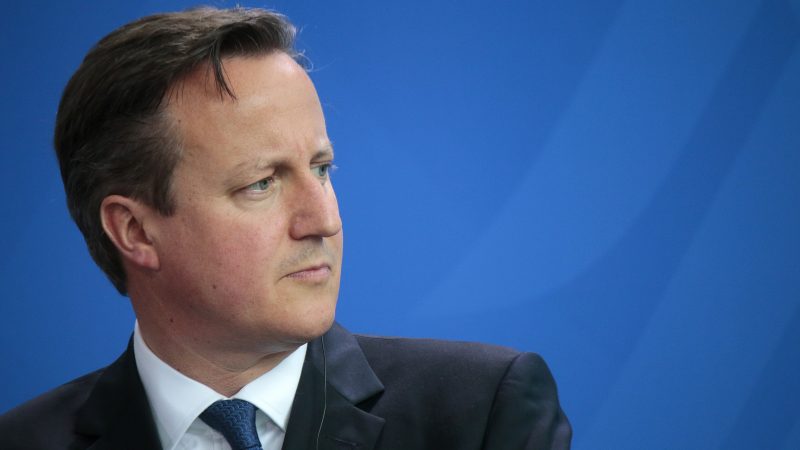
There was a time in Britain when political power in the shape of the King had to be constrained from interfering with the economic power of the barons. Thus capitalism eventually emerged protected by – but free from – the power of the state.
In recent years, an astonishing reversal has occurred. Politics was first fused with economic power and is now the prisoner of Big Capital. Meanwhile, the people are excluded by a system that only rarely works in their best interest. Take a look at one of the latest scandals.
Current lobbying rules lack any bite – as Cameron’s case shows
Milord Cameron of Chipping Norton once said that lobbying was “the next big scandal waiting to happen”. At the time, as leader of the opposition, he was making his pitch to the country that the Tories were no longer the “nasty party” of “sleaze”.
He must now regret his words, embroiled as he is in one of the biggest lobbying scandals of recent years. Lex Greensill was appointed as a government adviser on supply-chain finance during Cameron’s time as Prime Minister, albeit Cameron claims he has “no recollection” of approving Greensill’s job. After he left No 10, Cameron became an adviser to Greensill, with a “very significant economic interest in the firm“.
The 2021 Treasury committee investigation found that, in 2020 when the Covid pandemic hit, Cameron actively lobbied ministers, sending dozens of text messages, including nine texts to the current Prime Minister, Rishi Sunak.
None of this behaviour was deemed against the current rules. That’s because the rules lack any bite. I questioned the ethics of the matter with the minister in the Commons last month. If the minister didn’t have a satisfactory answer, it is because there isn’t one.
Ten years earlier, Cameron said that transparency was “the best disinfectant”. But it was clear that the Tories were not serious about cleaning up lobbying. The Cameron-led government introduced a Lobbying Act which was “light touch” on lobbying and draconian on the trade unions and campaigning organisations.
Individual scandals show the wider failure of our political system
It doesn’t just stop at Greensill. Cameron also went to work as vice-chair of a £1bn China-UK investment fund. Parliament’s intelligence and security committee said that Cameron’s appointment could have been “in some part engineered by the Chinese state to lend credibility to Chinese investment”. As Cameron is now Foreign Secretary, some are raising eyebrows at his recent calls for the UK to engage with China.
We have also seen the egregious way in which acquaintances of ministers have won contracts during the Covid emergency. Many were dying. Others were working night and day to keep the nation operational. But few saw the crisis as an opportunity to make money from the state’s requirements.
It’s easy to focus on individual scandals. But we need to see the big picture. They exemplify a wider systemic failure of our democratic structures. These are failures that have become so entrenched they have fuelled a deep mistrust in politics among most communities.
Even the Treasury committee acknowledged that Cameron’s clearance “reflects on the insufficient strength of the rules”. It said the Greensill scandal made a “strong case for strengthening [the rules]”. And yet, there are no proposals for change. So deep are the tentacles of big business in the operation of British politics that it is difficult to imagine the establishment introducing meaningful legislation.
Labour must make the case for fundamental change
I have continually argued for bolder rules on lobbying and associated activity such as the revolving door in and out of Whitehall, procurement misuse, all-party parliamentary groups and access to parliament. With interest, I read Richard Corbett’s article on lobbying rules in the EU, which shows that tightening the rules can be done.
Although, we should be more ambitious. We need to tackle the underlying asymmetry of power between the fusion of the ruling economic and political elites and the wider subdued population. The current rules that govern our country were founded at the time of the Norman conquest and are not fit for purpose in a modern democracy.
As I have said before, Labour must make the case for a fundamental transformation in Britain’s political institutions. It should begin with a few key proposals:
- Shifting the boundary between the market and a renewed public sphere.
- Breaking the grip that the privileged few have on our public institutions.
- Extending the franchise and reviewing how and where we vote, to ensure equality.
- Extending democratic control to all the corners of our economy, including the boardrooms of large corporations.
- Replacing the House of Lords and ensuring genuinely accountable democracy.
- Ending the overcentralised character of our state, which leaves it insulated from the views of the majority of our citizens.
Lobbying scandals, such as Cameron and Greensill, are often used for political point-scoring rather than to fuel change. And if we do not act to transform political power, we cannot ensure economic justice.
The next Labour government must act differently to those that have come before it. For too long, governments have talked a good game on cleaning up our politics, but when push comes to shove they have only tinkered around the edges. No longer can we tolerate a system in which getting your way in Westminster is based not on what you know, but on who you know.




More from LabourList
‘Labour won’t stop the far right by changing leaders — only by proving what the left can deliver’
‘Cutting Welsh university funding would be economic vandalism, not reform’
Sadiq Khan signals he will stand for a fourth term as London Mayor